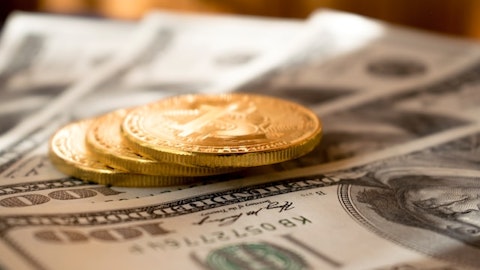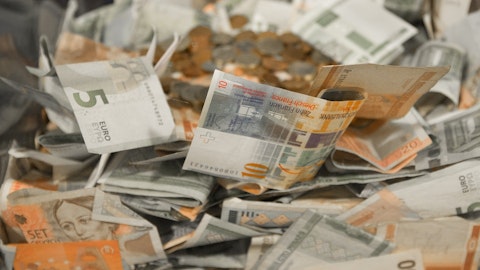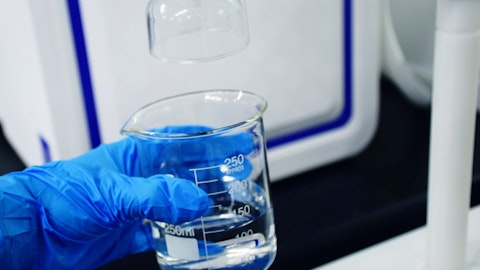In this article, we discuss 5 high-yield stocks to buy in February. If you want to read our detailed analysis on dividend capture strategy and past performance of high dividend stocks, go directly to read Dividend Capture Strategy: 10 High-Yield Stocks to Buy in February.
5. Shell plc (NYSE:SHEL)
Ex-Dividend Date: February 16
Dividend Yield as of February 6: 3.89%
Shell plc (NYSE:SHEL) is a London-based multinational oil and gas company that also specializes in petrochemicals. On February 2, the company declared a 15% hike in its quarterly dividend to $0.575/ADS per share. The stock will be trading ex-dividend on February 16. As of February 6, the stock has a dividend yield of 3.89%, coming through as one of the high-yield stocks on our list.
In December, Piper Sandler maintained an Overweight rating on Shell plc (NYSE:SHEL) with a $70 price target, appreciating the company’s outperformance in the last two years.
In Q4 2022, Shell plc (NYSE:SHEL) reported revenue of $101.3 billion, up 18.8% from the same period last year. The company’s operating cash flow for the quarter came in at $22.4 billion and its free cash flow stood at $15.4 billion. It returned $6.3 billion to shareholders in dividends during the quarter.
As of the close of Q3 2022, 39 hedge funds in Insider Monkey’s database owned stakes in Shell plc (NYSE:SHEL), the same as in the previous quarter. The collective value of these stakes is over $3.1 billion. Fisher Asset Management owned the largest stake in the company, worth over $1 billion.
Harding Loevner mentioned Shell plc (NYSE:SHEL) in its Q1 2022 investor letter. Here is what the firm has to say:
“While risks of unforeseen consequences arising from the Ukraine conflict are high, on this front we are cautiously optimistic that China will work hard to maintain its neutrality in a credible way, as it is a huge beneficiary of trade with the rest of the world, especially the rich developed nations. We think it likely that China, along with India, will continue to buy oil and gas from Russia (just as Europe, at least for now, plans to keep its gas pipelines open), and do not expect that fact to alter China’s trade relations with the West much. Nevertheless, we must contemplate that our optimism is misplaced on the importance of membership in the global network of exchange. If our central and optimistic case—admittedly an educated guess—is wrong, then we’d need to greatly modify our views of which companies in our opportunity set will face new barriers to profitable growth, and which might stand to benefit, relatively, from a further receding of globalization. (Global trade, after all, has never matched the peak share of GDP it reached in 2008, before the Global Financial Crisis.) We’d expect such a world to be less efficient, as the cold logic of comparative advantage is demoted as a determinant of which goods or services are produced and where. That would lead to a less prosperous world, since exploiting comparative advantage is a cornerstone of wealth creation. If regional blocs began to raise limits on the movement of capital as well as goods, we’d need to parse which of our multi-national companies were at risk of declining sales from increasingly hostile, siloed countries. Royal Dutch Shell (NYSE:SHEL) has found its Siberian oil and gas joint venture assets stranded by the combination of sanctions and the public opprobrium of Russia’s actions.”
Follow Shell Plc (NYSE:SHEL)
Follow Shell Plc (NYSE:SHEL)
Receive real-time insider trading and news alerts





